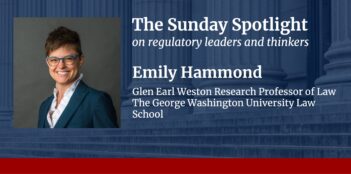
President Trump’s megalaw cuts health care funding, the Supreme Court allows President Trump’s layoffs, and more…
IN THE NEWS
- President Donald J. Trump signed into law a mega tax and spending law which cuts federal health care spending by over $1 trillion, according to the Congressional Budget Office. The law establishes an 80 hour per month work requirement for some Medicaid beneficiaries, limits provider taxes—a major source of federal Medicaid funding for states—and ends automatic reenrollment for Affordable Care Act policyholders while shortening the manual enrollment period. Supporters, including bill sponsor U.S. Representative Jodey Arrington (R-TX), claimed the law will reduce fraud and waste, but critics, such as Jennifer Mensik Kennedy, president of the American Nurses Association, expressed fear that the funding cuts will harm rural hospitals, which rely heavily on federal funding.
- The U.S. Supreme Court lifted a lower court order blocking President Trump’s executive order that requires federal agencies to lay off thousands of workers. In the unsigned 8-1 opinion, the Court declined to consider the legality of agency layoff plans because no particular plans were before the Court. Justice Ketanji Brown Jackson dissented, arguing that the majority was releasing “the President’s wrecking ball” on Congress’s policymaking role. The federal worker unions that sued the government issued a statement urging the need for congressional approval to lay off large numbers of federal employees.
- Judge Joseph Laplante of the U.S. District Court for the District of New Hampshire issued an injunction that blocks enforcement of President Trump’s executive order ending birthright citizenship for the U.S.-born children of illegal migrants or parents whose presence in the United States was legal but temporary. The ruling protects a provisionally certified class of “all current and future persons who are born on or after February 20, 2025” whose mother is either (1) not lawfully in the United States or (2) lawfully but temporarily in the country, and where the father is not a U.S. citizen. The judge paused enforcement of the ruling to allow time for government appeal.
- President Trump signed an executive order directing federal agencies to eliminate incentives for renewable energy projects in accordance with his new mega tax and spending law. The order instructs the U.S. Department of the Treasury to end tax credits for wind and solar energy and to revise guidance on exceptions for projects already underway, aiming to prevent “artificial acceleration or manipulation of eligibility.” The order also requires the U.S. Department of the Interior to review its policies and remove “preferential treatment” of wind and solar energy projects.
- The U.S. Supreme Court denied Florida’s request to stay a lower court’s decision blocking the state from enforcing its new law that makes it a crime for undocumented immigrants to cross into the state. The Court’s one-sentence order provided no explanation for the decision. In April, U.S. District Judge Kathleen M. Williams temporarily blocked enforcement of Florida’s law. The U.S. Court of Appeals for the Eleventh Circuit then denied Florida’s request to pause the ruling.
- Brazilian President Lula da Silva vowed to match President Trump’s proposed 50 percent tariffs on Brazilian goods with identical duties on U.S. imports, raising the likelihood of a major trade clash. Da Silva criticized President Trump’s claims of unfair trade, saying that Brazil may turn to the World Trade Organization and invoke Brazil’s new Economic Reciprocity Law aimed at protecting the country’s economy. The U.S. tariffs on Brazil and other countries are set to take effect in August. President Trump warned of further hikes if Brazil responds with tariffs.
- The U.S. Court of Appeals for the Eighth Circuit disallowed a proposed Federal Trade Commission (FTC) “click-to-cancel” rule that would have required businesses to provide consumers with simple cancellation options for subscriptions. The unanimous panel reasoned that the FTC erred in its rulemaking process by failing to provide a preliminary regulatory analysis, which is required for FTC rules with an annual effect on the national economy that is greater than $100 million. An administrative law judge had determined that the rule’s compliance costs for businesses would exceed this threshold. The court noted that, although it did not “endorse the use of unfair and deceptive practices,” the rule could not remain in place due to “fatal” procedural deficiencies.
- Antitrust regulators have approved a wave of major corporate mergers under the second Trump Administration. In June alone, the U.S. Department of Justice’s Antitrust Division and the FTC cleared $63 billion in deals, including Mars’s purchase of Kellanova and Omnicom’s buyout of Interpublic. Officials say they will allow mergers to proceed quickly if the transactions do not raise competition concerns. This approach could ease paths for future deals such as Ferrero’s purchase of WK Kellogg. Other deals are still under review.
WHAT WE’RE READING THIS WEEK
- In a National Bureau of Economic Research working paper, John J. Donohue, the C. Wendell and Edith M. Cartersmith Professor of Law at Stanford Law School, and several coauthors examined the effect of stricter concealed carry gun control laws on the rate of carry licenses and public safety outcomes. The Donohue team cited the U.S. Supreme Court’s 2022 decision in NYSRPA v. Bruen as part of a nationwide trend toward more permissive concealed carry regulation. The Donohue team compiled data on every state-level change to concealed carry laws from 2000 to 2022, considering both training requirements and permit fees. Donohue and his coauthors then compared the data with the number of concealed carry permits issued and the rate of violent crimes, accidental shootings, and child-involved incidents. They found that more stringent requirements neither deterred people from obtaining concealed carry permits nor improved public safety outcomes.
- In a recent Brookings Institution essay, Brooke Tanner, a Brookings research analyst, and Nicol Turner Lee, director of the Center for Technology Innovation at Brookings, discussed the potential for child online safety legislation to inadvertently harm LGBTQ youth. Tanner and Turner Lee identified vague language in laws such as the proposed Kids Online Safety Act, which would limit content related to “sexual exploitation,” that some regulators may interpret to include LGBTQ content. This poses risks, Tanner and Turner Lee argued, for LGBTQ youth, who disproportionately rely on online medical and mental health resources. They proposed alternatives, such as requiring affirmative opt-in to view sensitive content, and emphasized that any online protection law must be drafted with consideration for how regulatory authorities could interpret language to facilitate censorship.
- In a recent essay in the Yale Journal on Regulation’s blog, Notice and Comment, Jeffrey Lubbers, a professor at the American University Washington College of Law, analyzed the U.S. Supreme Court’s decision in Trump v. CASA, Inc. and its implications for universal relief in administrative law. Lubbers explained that the Court, in a 6–3 ruling, held that federal courts cannot issue universal injunctions unless relief limited to the plaintiffs would be inadequate to protect the plaintiffs from the harm they will suffer. Lubbers highlighted an important footnote in which the Court left open the question of whether the Administrative Procedure Act (APA) authorizes courts to void a regulation on a universal basis. Lubbers concluded that the Court’s narrowing of injunctive relief may signal an eventual reckoning over the scope and future of APA remedies.
EDITOR’S CHOICE
- In an essay in The Regulatory Review, Benjamin Leffel, an assistant professor at the University of Nevada, Las Vegas, argued that, amid diminishing federal environmental regulation, state and local regulators can advance decarbonization through the combination of financial incentives and regulatory restrictions. Although Leffel noted that financial incentives have the strongest single impact, they emphasized the complementary relationship between the two. For example, Leffel explained, stricter decarbonization requirements for new construction become more effective in tandem with incentive programs that make compliance cheaper, such as upfront financing for renewable energy upgrades that builders can repay over time through property taxes. Leffel encouraged cooperation between local regulators and private businesses to design and implement effective incentive programs.



